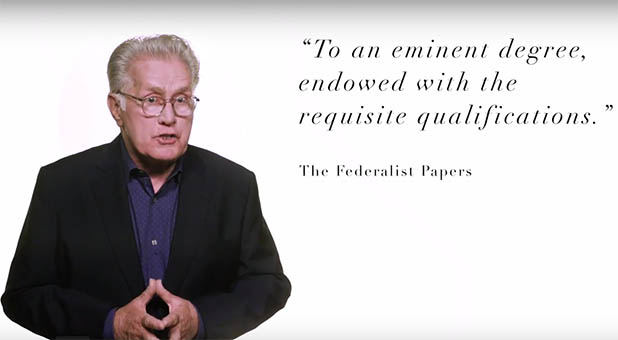Distraught Celebs Demand Electors Unite Against Trump
Prior to the Nov. 8 general election, a group of celebrities banded together to tell Americans how they should vote (i.e. not for now-President-elect Donald Trump).
It resulted in some pretty hilarious reactions from conservatives, another other people who value intellectual independence over groupthink. But now, they’re back at, telling Republican electors they have a responsibility to the country to vote for someone other than the president-elect.
It starts out with Martin Sheen—who once played the president of the United States on TV—calling out the Electoral College and sharing with them a cherry-picked quote from Federalist 68. He says:
“Republican members of the Electoral College, this message is for you. As you know, our Founding Fathers built the Electoral College to safeguard the American people from the dangers of a demagogue and to ensure that the presidency only goes to someone who ‘is, to an eminent degree, endowed with the requisite qualifications’.”
Eminent is a big word, so they bring in Debra Messing—who hasn’t played a president on TV—to define it for you. And then they troll out a bunch of other celebrities—most of whom you probably don’t recognize, either because of obscurity or Botox (or both).
In the end, they want Republican electors to know it’s OK if they don’t vote for former Secretary of State Hillary Clinton as long as they don’t vote for Trump. And, if enough of them don’t vote for the president-elect, they can work their Hollywood charm on the House of Representatives.
You know, because “celebrity.”
But here are a few bits and pieces of what Alexander Hamilton actually wrote in Federalist 68, the parts these liberal elites don’t want you to know about:
It was desirable that the sense of the people should operate in the choice of the person to whom so important a trust was to be confided. This end will be answered by committing the right of making it, not to any pre-established body, but to men chosen by the people for the special purpose, and at the particular conjuncture.
It was equally desirable, that the immediate election should be made by men most capable of analyzing the qualities adapted to the station, and acting under circumstances favorable to deliberation, and to a judicious combination of all the reasons and inducements which were proper to govern their choice. A small number of persons, selected by their fellow-citizens from the general mass, will be most likely to possess the information and discernment requisite to such complicated investigations.
It was also peculiarly desirable to afford as little opportunity as possible to tumult and disorder. This evil was not least to be dreaded in the election of a magistrate, who was to have so important an agency in the administration of the government as the president of the United States. But the precautions which have been so happily concerted in the system under consideration, promise an effectual security against this mischief. The choice of several, to form an intermediate body of electors, will be much less apt to convulse the community with any extraordinary or violent movements, than the choice of one who was himself to be the final object of the public wishes. And as the electors, chosen in each State, are to assemble and vote in the State in which they are chosen, this detached and divided situation will expose them much less to heats and ferments, which might be communicated from them to the people, than if they were all to be convened at one time, in one place.
Keep in mind, at the time of the Constitution’s writing, the “popular vote” was to choose electors who were pledged to support a particular candidate. Today, we vote for the candidate, whose party provides a slate of electors, should he win a particular state.
As far as the Constitution is concerned, it’s a difference without a distinction, but in the minds of one its principle defenders, Hamilton, there’s a huge distinction. Today, Americans are far better educated—low-information voters included—than the average American of the late 18th century.
So, while the author of Federalist 68 did, in fact, assert that electors were meant to ensure the eventual president of the United States was “eminently qualified” to hold the office, he also cautioned against efforts to strong-arm the outcome. The Founders and framers alike abhorred “democracy,” which is why they established a republican form of government.
Continuing beyond the single, cherry-picked sentence the liberals are clinging to, here’s what Hamilton added:
Talents for low intrigue, and the little arts of popularity, may alone suffice to elevate a man to the first honors in a single State; but it will require other talents, and a different kind of merit, to establish him in the esteem and confidence of the whole Union, or of so considerable a portion of it as would be necessary to make him a successful candidate for the distinguished office of President of the United States.
Click here to read the entirety of Federalist 68. {eoa}














































